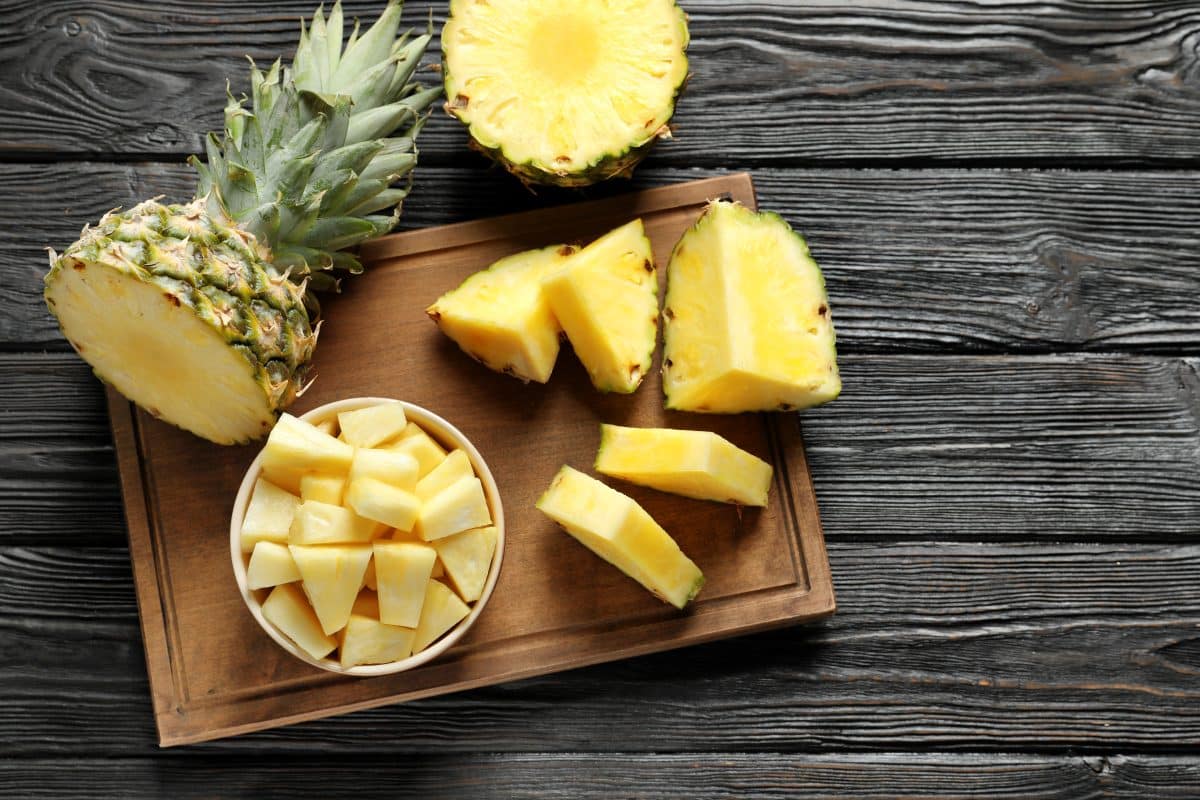Is pineapple FODMAP friendly? (includes safe portions + recipes)
- Low FODMAP diet
You may be wondering whether the pineapple FODMAP content is low enough for you to enjoy on a low FODMAP diet – the short answer is yes!
If you have IBS and are on a low FODMAP diet, finding Low FODMAP fruits that you can include in your diet can be challenging.
The good news is pineapple can be included in a low FODMAP diet while providing a wide range of health benefits and helping you hit that 5-a-day!

Is pineapple FODMAP friendly?
Yes, the pineapple FODMAP content is low enough to include in your diet within certain serving size recommendations. The serving sizes approved as low FODMAP vary between fresh, canned, and dried varieties.
Fresh pineapple
Monash reports that fresh pineapple FODMAP content is low in servings up to 1 cup or 140g (1). This means enjoying pineapple as part of your low FODMAP diet is possible – in meals, as a delicious snack, or as dessert.
However, be aware that moderate/high amounts of oligo-fructans exist in larger serving sizes and would exceed the guidelines.
Canned pineapple
Canned pineapple varies in the fructan content depending on the packing liquid (i.e. canned in syrup or juice).
Fructans are part of the oligosaccharides group (the O in ‘FODMAP’). Because fructans are not digested well in the small intestine (2), it causes excess gas, resulting in nausea, flatulence and bloating for some people with IBS.
Pineapple canned in juice contains fewer fructans than the syrup varieties. Pineapple packaged in juice is low in FODMAPs up to 90g, while canned in syrup is low in FODMAPs, only up to 65g.
Dried pineapple
You should limit your intake of dried pineapple in the restriction phase of the low FODMAP diet.
This is because dried pineapple is also higher in oligo-fructans than its fresh counterpart, with moderate amounts in each 25g, as it is more concentrated.
Is pineapple juice low FODMAP?
At this point, pineapple juice has not been tested for FODMAP content by Monash so it may be safer to avoid this if you are on the restriction phase.
After the restriction phase you can test pineapple juice separately to see if it causes you any issue.
If you drink pineapple juice, be wary of juices with added sweeteners. You can check out our post on ‘which sweeteners are low FODMAP’ for further guidance.
However, there are also plenty of other Low FODMAP Fruit Juice options to choose from which have been tested.
Health benefits of pineapple
Fruit and vegetables are crucial to promoting your long-term health, with the UK government recommending ‘5-a-day’. Like many other fruits, pineapple contains high amounts of vitamins, fibre, and other beneficial compounds.
Pineapple is especially rich in vitamin C, which helps the growth and development of bones, skin and blood vessels and acts as an antioxidant (3).
Manganese is a trace mineral which is present in pineapple. Our bodies cannot make it, so we rely on dietary sources. It has many roles in our body, including food breakdown, bone health, immune health, and wound healing (4).
Throughout history, people have used pineapple to treat digestive disorders, particularly in Central and South American countries.
It may have been effective because it contains a compound called bromelain, a digestive enzyme.
Research has explored the effects of bromelain, which showed that it is beneficial in long-term health and linked to less inflammation and a lower risk of blood clots (5).
Some research has also shown that bromelain can reduce symptoms of diarrhoea (5). However, the studies investigating this were not in people with IBS or using pineapple.
Pineapple may help regulate your bowel movements, as it contains water and fibre.
The general recommendation in the UK is for people to consume 30g of fibre daily (6), including people with IBS, as there are no specific IBS recommendations. You can read more about how to get 30g of fibre a day here.
Low FODMAP pineapple recipes
To get all the health benefits of pineapple and contribute to your 5-a-day, we have included some low FODMAP recipes below for you to enjoy.
Salads
Smoothies
Main meals
- Pineapple chicken and coconut rice
- Low FODMAP sweet and sour chicken
- Spiced snapper with BBQ corn and pineapple dressing
- Vegetarian pineapple fried rice
Desserts
Is Pineapple Low FODMAP?: Summary
Pineapple can be a delicious low-FODMAP fruit if you consume portions within the recommended serving sizes. For fresh varieties, this would be up to 140g.
Whereas for canned versions, for the pineapple FODMAP content to be low enough, the serving size would be 90g for those packed in juice and 65g for those packed in syrup.
Not only is the pineapple FODMAP content generally low, but the bonus of including pineapple in your diet is that it has plenty of other potential health benefits!
Pineapple is high in vitamin C, manganese, fibre, and other compounds such as bromelain. These may help digestion, growth and development and support a healthy immune system.
There are plenty of ways to include pineapple in your diet more regularly, as a snack on its own or in salads, smoothies, desserts, or even your main meals!
Written by Annabelle Green Registered Dietitian, reviewed by reviewed by Kirsten Jackson, Consultant Dietitian BSc Hons, RD, PG Cert